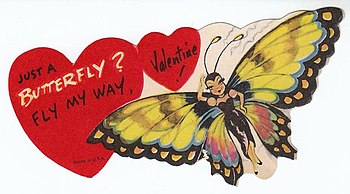| Children’s Valentine, 1940–1950 (Photo credit: Wikipedia) |
Happy Valentine’s Day…
Today’s post happens to fall on Valentine’s Day, so we would be remiss if we didn’t wish our readers a Happy Valentine’s Day. How much do you really know about this holiday? Of course, as soon as the New Year begins retail stores transform their greeting card and seasonal gift displays to promote one of the most popular holidays in America – Valentine’s Day. Rest assured billions are spent to celebrate this day and while many absolutely love the day, just as many find it depressing and stressful.
Do you have great or sad Valentine memories, or perhaps a little of both?
Since Valentine’s Day falls in February right smack in the middle of most school years – grade school through post graduate school – students (particularly toddlers through teenagers) are almost pushed to celebrate the day. With young children parents purchase little cards for their young ones to “address” to every classmate, because you don’t want to hurt anyone’s feelings. Each child might bring a fun food treat to share, parents purchase or make cupcakes, find “heart” candies (the original “texting”) to fill little favor bags. As children reach adolescence and teenage years this holiday can bring with it a certain amount of angst and stress: Will my “special someone” send me a Valentine card? Will I receive a little gift? Or will my “special someone” break-up with me two days before Valentine’s Day? Will I be teased or bullied because I receive no Valentine’s? All of these scenarios are played out in classrooms across the country.
So what about teens and stress?
This week the American Psychological Association (APA) released the results of their Stress in America™ survey. According to the APA, they have conducted this yearly nationwide survey since 2007 in an effort to better understand the state of stress in the country and its impact. This most recent survey focused on teenagers, asking the question: “Are teens adopting adults’ stress habits?”
Survey’s parameters…
The survey was conducted for the APA by Harris Interactive Inc:
- Survey was conducted online in August 2013
- 1950 adults (18+) participated
- 1018 teens (ages 13 to 17) participated
- Results were weighted for age, sex, race/ethnicity, education, region and household income
Survey’s findings
USA Today provides a useful overall review of the statistics and conclusions: Teens feeling stress, and many not managing it well.
“Teens’ average stress level was 5.8 out of 10 during the school year and 4.6 in the past month — the survey was taken in August. Adults reported average levels of 5.1 in the past month.
As a result of stress, 40% of teens report feeling irritable or angry; 36% nervous or anxious. A third say stress makes them feel overwhelmed, depressed or sad. Teen girls are more stressed than boys, just as women nationally are more stressed than men.”
The report says stress appears to be affecting teens’ performance in all aspects of life:
- 59% report that managing their time to balance all activities is a somewhat or very significant stressor;
- 40% say they neglected responsibilities at home because of stress; 21% say they neglected work or school because of stress;
- 32% say they experience headaches because of stress; 26% report changes in sleeping habits;
- 26% report snapping at or being short with classmates or teammates when under stress.
An overview by News10 NBC WHEC
If you are having trouble viewing the video, you can see it here.
Some closing thoughts from the APA
We have tried to provide our readers with helpful resources regarding the survey results. You can read the APA’s full press release here. The APA’s CEO and Executive Vice President Norman B. Anderson, PhD, offers the following advice: “Parents and other adults can play a critical role in helping teens get a handle on stress by modeling healthy stress management behaviors. When spending time with teens, we can encourage them to exercise, eat well, get the sleep they need and seek support from health care professionals like psychologists to help them develop healthier coping mechanisms for stress sooner rather than later.”
Young teens need to learn firsthand to take a holistic approach to their well-being. Start today…feel better by offering a smile and a Happy Valentine’s Day greeting to someone.














